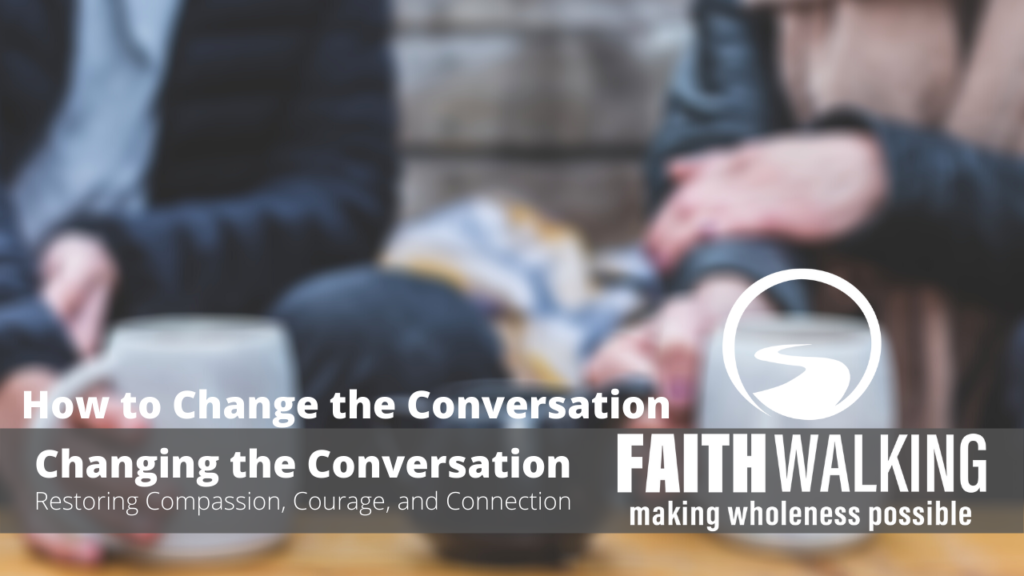
Written by Marcos Leon
“For the sake of my sanity, I limit the news I read every day.” That is one of the most common comments I hear regarding the impact of the current societal conversation on friends and acquaintances. Although there may be some wisdom in that statement, I’m not sure that limiting the amount of news we read these days is enough to maintain our sanity! The question that arises is how to change the current conversation we are experiencing in a way that keeps our sanity and our souls alive.
Before attempting to answer this question, it’s important to remember that although you may not be able to change the conversation on a societal scale, you can change some of that conversation at a personal level in a way that is meaningful and impactful for you. It is also helpful to recognize the automatic anxious responses and attitudes that are often our first temptation in dealing with conversations we don’t like: we distance from them, ignoring them, or we lash out. If you have been around Faithwalking for a while, I’m sure you know that those approaches usually don’t work.
I believe you need three things to change the conversation for yourself personally. First, you need to create space for an alternative conversation to unfold, a conversation that is rooted in the practice of dialogue instead of the polarized and divisive communication so common during this season. Remember that the goal of dialogue is understanding, not agreement. Remember also that the skill of dialogue is about listening rather than changing the other person’s perspective.
Second, I believe that in order to change the conversation, you need to create space for personal reflection, prayer, and meditation so that you can remember who you are and who you want to be in the context of these turbulent times. Chances are that in the midst of anxiety you will forget! It will probably be in calm moments of reflection and recollection that you can ground yourself again in those guiding principles and core values that are part of the ongoing revelation of God about who you are. In moments of reflection, you will also be able to do the work you need to do in order to manage yourself in moments of anxiety so that you can be present to what is really being said in the ongoing conversation.
Finally, to change the conversation you need to create space for joy in your life! Yes, joy. Let me explain. There is significant evidence that our human brain is biased towards the negative. This means that you don’t need to make any effort to find yourself dwelling in the negativity that is characteristic of the ongoing public conversation. A lot of effort is required to notice what is positive. Some experts say you need at least 15 seconds of intentional focus on what is positive to allow it to make an impression in your brain. Unless you learn to actively balance what is influencing your life, you will be unconsciously shaped by negativity. So, it’s important to realize what brings joy to your life and practice those things, especially in hard times. A helpful distinction to remember here is between what brings true joy to your heart and what brings only distraction or entertainment. Choose what is best.
Stick with us as we keep unfolding the idea of changing the current conversation for the sake of our sanity and for the sake of love. Read and listen to the stories of those who are bearing witness that an alternative conversation is possible. In the coming weeks we will explore what it means to restore compassion, courage, and connection.
And please, consider partnering with us as we push forward with our campaign through to the end of the year.
____________
Please consider supporting Faithwalking through:

Giving. Help us reach our financial goal this year. We are praying and hoping for:
$35,000 by the end of 2020 in one-time gifts, plus:
– 60 monthly donors of $15 per month
– 40 monthly donors of $25 per month
– 20 monthly donors of $55 per month
Pledge or contact us to arrange your giving

Praying. Help us by committing to pray for us weekly.
We need discernment, wisdom, and provision of human and financial resources to make Faithwalking possible and accessible. Join our intercessor team.

Promoting. Help us promote the work of Faithwalking: like and share our posts, and post about our work.
There are several ways people can learn about Faithwalking at no cost. Help us promote:
The Faithwalking Facebook page
Please also help us promote our
Faithwalking Foundations modules and Ongoing Education offerings
Why Faithwalking?
We believe that God’s intended design is for wholeness in individuals, communities, and the world. We believe that God’s hope is for shalom to be present, which includes peace, unity, completeness, wholeness, and well-being for everyone and in everyone. God’s hope is for the Kingdom to come on earth as it is in heaven.
We live in a world of brokenness: People are chronically anxious and reactive, internally conflicted, frequently unloving, and regularly unconcerned about the common good. Many Christians are inconsistent in following the way of Jesus.
Our Mission
To make wholeness possible for individuals, communities, and the world.
We do this through a process of spiritual formation where people are equipped with tools to gain freedom from wounds of their past, grow in emotional maturity, and live lives of purpose on mission with God, so that they increasingly follow the way of Jesus by serving the poor, the marginalized, and those in need, working for the common good, and restoring individuals, social systems, communities, and nations to God’s intended design.
Our Vision
Our vision is for Faithwalking to be accessible to every person in the world so that participants become agents of wholeness in their own context.


